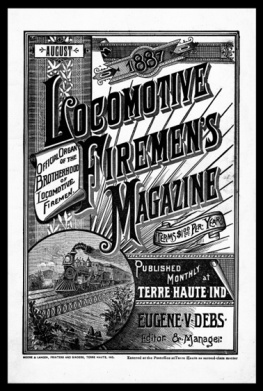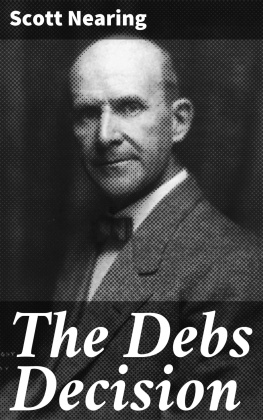Davenport Tim - The Selected Works of Eugene V. Debs, Vol. I
Here you can read online Davenport Tim - The Selected Works of Eugene V. Debs, Vol. I full text of the book (entire story) in english for free. Download pdf and epub, get meaning, cover and reviews about this ebook. City: United States, year: 2019, publisher: Haymarket Books, genre: Home and family. Description of the work, (preface) as well as reviews are available. Best literature library LitArk.com created for fans of good reading and offers a wide selection of genres:
Romance novel
Science fiction
Adventure
Detective
Science
History
Home and family
Prose
Art
Politics
Computer
Non-fiction
Religion
Business
Children
Humor
Choose a favorite category and find really read worthwhile books. Enjoy immersion in the world of imagination, feel the emotions of the characters or learn something new for yourself, make an fascinating discovery.
- Book:The Selected Works of Eugene V. Debs, Vol. I
- Author:
- Publisher:Haymarket Books
- Genre:
- Year:2019
- City:United States
- Rating:5 / 5
- Favourites:Add to favourites
- Your mark:
- 100
- 1
- 2
- 3
- 4
- 5
The Selected Works of Eugene V. Debs, Vol. I: summary, description and annotation
We offer to read an annotation, description, summary or preface (depends on what the author of the book "The Selected Works of Eugene V. Debs, Vol. I" wrote himself). If you haven't found the necessary information about the book — write in the comments, we will try to find it.
The Selected Works of Eugene V. Debs, Vol. I — read online for free the complete book (whole text) full work
Below is the text of the book, divided by pages. System saving the place of the last page read, allows you to conveniently read the book "The Selected Works of Eugene V. Debs, Vol. I" online for free, without having to search again every time where you left off. Put a bookmark, and you can go to the page where you finished reading at any time.
Font size:
Interval:
Bookmark:
Introduction
This is the first of a six-volume series gathering the most important writings of American socialist and union organizer Eugene Victor Debs (18551926). As there have been more than twenty dedicated volumes and countless scholarly articles focusing upon the five-time Oestreicher:
To his Socialist Party comrades and to political soul mates of the Left ever since, Debs was a secular saint, the center of a modern morality play. A talented man who looked as if he were going to be an all-American success story, Debs gave up personal security to become the voice of the downtrodden and dispossessed. Ignoring his own safety, welfare, and even physical health, he spoke eloquently for victims of capitalism who would otherwise not have been heard. Twice he went to jail for refusing to abandon his principles, the second time, at the age of sixty-two, despite the urging of friends who feared that his unsteady health would not survive the rigors of prison. Indeed, when he left prison after three years, he was sick; and he died only five years later without ever regaining his earlier vigor, a martyr to the cause.
Yet for all the books and articles written about Gene Debs, a vanishingly small percentage of his millions of preserved words have been gathered for a modern audience. Over the years a few limited attempts have been made, to be sure, including several worthy of mention. Debss third run for the presidency under the banner of the Socialist Party of America in 1908 provided inspiration for an initial effort to compile and republish some of his speeches and articles. Virtually no effort was made to further explore Debss nineteenth-century writings, however.
To these important republications of Debss work may be added three lesser
known compilations from the first half of the twentieth century: a slim tome published in 1916 by St. Louis socialist Phil
It would be four decades before another effort was made to select and present the articles and speeches of Gene Debs for a new audience.
The first fifteen years of the twenty-first century have seen the publication of two additional volumes selecting Debss speeches and articles. The first of these, The published in 2009, does manage to save two new Debs works from the mists.
The nine projects mentioned above, published over the course of an entire century, have managed to preserve only about one hundred of an estimated four thousand published Debs items between book covers. Of these, a mere nine pieces date from the first half of Debss literary activity, the years of the nineteenth century. It is to these early years that we shall turn in the present volume.
The Early Years
The Debs story began during the second half of the 1840s in the ancient town of Colmar, located in the Alsatian region of northeastern
Exhausted with familial narrow-mindedness and parochialism, Daniel boldly cut ties and emigrated for a new life in America.
After a year in New York and a brief repose in
Eugene Victor
Gene was initially enrolled in the private Old Seminary School of Debs added a memorable punch line, chiming in, I never did either.
This makes for a pithy witticismindeed, one that has been repeated endlessly by Debss biographers
Gene apparently learned French in the home, it being his parents native tongue. One is struck by the fact that he never wrote letters to his parents in that language, nor did he incorporate more than a few French words into his writing or speechesthe recurring phrase avant courier being one rare example. Debs studied German in the classroom and was additionally exposed to the language through his fathers reading aloud to the family each week from the classics. Gene does not seem to have pursued the reading of the German literature of the international
In May 1870 the fourteen-year-old opted to leave school for the remunerative world of work, thus beginning his short career working on the railroada brief few years of youthful endeavor elevated by hagiography into heroic proletarian myth. Salvatore, has observed,
Skilled railroad workers... were among the most respected and highest paid workers in America during the 1870s and 1880s. Tradition held, and it was borne out by the experience of many, that the opportunities for advancement were impressive, even for a young lad beginning in an unskilled trade.
Working on the railroad offered both adventure and the opportunity for advancement for an ambitious young man exploring a future career. The rival recollection of Genes sister
Gene found his first
Concurrent with his railroad work, Debs managed to return to the classroom, regularly taking courses over three years at a local business college.
Gene was soon promoted from the mundane chores of a switch engine
On the evening of February 27, 1875, Joshua
Simultaneous with his activity in the Brotherhood of Locomotive Firemen, Debs embarked upon a new career pathone having nothing to do with the transportation industry. Coming from a family of grocers, Debs was hired in 1875 by
In his spare time, Debs was active in cofounding and leading a local
The young Gene Debs was, in a word, ambitious. Money was never the object; rather, Debs was a young man in a hurry, anxious to exert his independent manhood, to build reputation and status, to make good in the world. He was aided by a friendly, winning way with strangers and a carefully developed oratorical prowess that allowed his enthusiasm and personal magnetism to shine. This skill set proved a perfect fit for a life in politics; local Democratic Party leaders, noting the youngsters golden tongue and a palpable earnestness that could win a room, were eager to latch on to the blue-eyed Alsatian as a potential future star. And so, just as Debs had abandoned the uncertainties of railroad work for the stability of a job in the wholesale food industry in 1875, he left the grocery business for a career in politics in 1879, still remaining engaged with his beloved Brotherhood of Locomotive Firemen in an ever-growing capacity.
Debss first venture into electoral politics came in the
Although he had run for office under the vague and ill-defined slogan of reform, Genes service as an elected city official was ordinary, with the youngster winning plaudits for the effective performance of his duties. The local press noted the efficiency with which he conducted the citys business and his thoroughness in keeping the citizenry apprised of the activities of the Terre Haute city council. Locomotive Firemens Magazine.
Local Democratic worthies remained eager to tap Debs for high office. In 1884 the twenty-nine-year-old was nominated by the Democrats for a place in the
On June 9, 1885, at the zenith of his six-year apprenticeship as an aspiring Democratic politician, Gene The couple never had children.
Each of the various railway crafts established their own fraternal benefit societies during the years of rapid railway expansion following the Debss written output became more voluminous with his July 1880 promotion to full editorship of Locomotive Firemens Magazine. He would remain in the editorial chair until the fall of 1894, publishing approximately 170 monthly issues of the journala total of perhaps 2 million editorial words.
Debss thinking evolved enormously over timea transformation paralleled by ideas of the American labor movement in general and the attitudes of society at large as the Once orderly and faithful behavior was instilled, the brotherhoods believed, then their members would find themselves regarded as desirable employees by intelligently managed modern railroads, and fair and appropriate remuneration would inevitably follow.
Debss gradual embrace of working-class consciousness, his adoption of anti-corporate politics, and his growing acceptance of the necessity of class struggle for economic improvement is one fundamental thread to be seen in this book.
Next pageFont size:
Interval:
Bookmark:
Similar books «The Selected Works of Eugene V. Debs, Vol. I»
Look at similar books to The Selected Works of Eugene V. Debs, Vol. I. We have selected literature similar in name and meaning in the hope of providing readers with more options to find new, interesting, not yet read works.
Discussion, reviews of the book The Selected Works of Eugene V. Debs, Vol. I and just readers' own opinions. Leave your comments, write what you think about the work, its meaning or the main characters. Specify what exactly you liked and what you didn't like, and why you think so.











